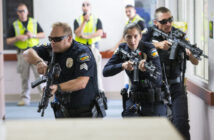Tuesday was the first time I watched the video of the officer-involved shooting in North Charleston, South Carolina. Officer Michael Slager shot Walter Scott after he fled from his vehicle during a traffic stop.
I watched it several times to make sure I was seeing it correctly. All I could think at the time was: “You’re kidding me! What were you thinking?”
With all the negative attention being placed on police officers around the country, I thought to myself, “This is all we need.”
The shooting validates everything police critics have been saying. An officer killed an unarmed black man in a fit of rage, apparently without just cause and then tried to cover it up.
I listened to the news commentary, the parade of community activists, police experts, pundits and others give their two-cents worth. I could feel my stomach acid getting worse and reached for a bottle of Tums.
The next day, I led a police manager course on media relations. The attendees were lieutenants from all over California.
The conversation eventually turned to the North Charleston shooting. As the discussion progressed, some were discouraged, others tried to play out possible scenarios that would somehow explain Officer Slager’s actions. In the end, there was one area everyone agreed on: it looks bad, really bad.
One lieutenant shared his thoughts by simply stating, “In the end, no matter what happens, we still lose. If the officer is eventually found guilty, it calls into question every officer involved shooting investigation ever conducted where there is no video. If Officer Slager is found not guilty, it substantiates the very real perception that ‘black lives don’t matter.’”
Given the information available, this is definitely a case for the courts to review. Officer Slager deserves his day in court, and he will get it. Let the cards fall where they may.
The next day, I was with a group of police academy recruits and we briefly discussed the events in North Charleston. Untainted by the cynicism years of law enforcement experience can foster, they were eager to share the wisdom 18 weeks of academy training has provided.
The recruits agreed: If Officer Slager moved his Taser and then intentionally falsified his report, this was not an issue any amount of training could fix. This is, first and foremost, an integrity issue and you either have it or you don’t.
Kudos to the police academy staff for having instilled this insight so early in the recruits’ careers.
There is no doubt the focus on police use of force has drawn national attention in both mainstream and social media. It has called into question the trustworthiness of every officer across the country.
Professional police officers everywhere are disgusted and disheartened by the thought that the story being portrayed might be true.
If Officer Slager really did shoot without sufficient threat to his safety, it’s reasonable to question his judgment and decision making. A person has lost his life because of it.
If he tried to cover it up by repositioning the discarded Taser and then gave a false statement about what occurred, that’s not just dishonest, but criminal and he deserves to punished to the full extent of the law. I haven’t spoken to an officer yet that wouldn’t agree with that.
Some have even said the officer deserves to be punished even more because the public expects more from the people who are sworn to serve and protect.
For the majority of good, decent, honest police officers this has been a disheartening time. They keep doing their job the best they can every day and yet an event clear across the country seems as if it happening next door and its impact is felt everywhere.
The very officers out there who don’t get it need to be ferreted out or decide it’s time to move on to other careers. Honest and professional police officers don’t need you and they really don’t want to work with you.
As I sit here writing this I was just sent a video link with the message, “This looks bad.” I really should get more Tums.
 Behind the Badge
Behind the Badge



